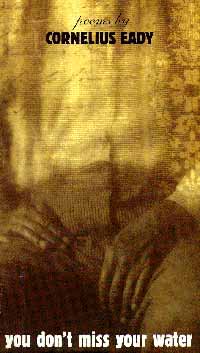
by Cornelius Eady

by Cornelius
Eady
New
York: Henry Holt & Co., 1995
33pp., $12.00
ISBN: 0 8050 3668 7
Review by Chris Lott
Eady's
latest volume of poems is easily one of the most powerful
books of poetry
published in the last couple of years. These are
Prose poems with a blues
rhythm and sensibility, exquisitely
constructed and emotionally
overwhelming.
Bottom line: Poetry reader or not. . . get this book!
In my experience with Cornelius Eady's earlier work, particularly the volume Victims of the Latest Dance Craze, which won the Lamont Poetry Prize in 1985, I always felt that there was something missing in the poems, that there was something nearly undefinable lacking in them. I couldn't put my finger on it then, but reading you don't miss your water, Eady's latest effort, I suddenly realized that what I was searching for was some emotional focal point. Until this volume I had always felt that Eady's poetry, though very moving, was tossing me in all directions with no clear understanding of where the movement was originating.
You don't miss your water is composed of 21 prose poems that each fill this emotional gap… indeed, sometimes they overfill it! All of the poems deal with the death of Eady's father and Eady's life afterwards in the cold legacy his distant father left behind. The strength of these poems lies directly in the harsh physical and emotional strength of Eady's father working against and within Eady's own poetic vigor. On his deathbed, shrunken and weak, Eady's father takes a twenty-dollar bill from his son's hand:
"I remember the strength left in his fingers, the way
they clamped around the bill. If it was a kiss, we'd
tease, who's your girlfriend? If it was a moment in a
song, the lyric would sing, without you, I'm nothing."
It is a common theme throughout the book that these poems are indeed what is being spoken since Eady's relationship with his father was not a kiss or a moment in a song, but a full-blown reality that is impossible to intellectualize and consists of questions with no easy answers.
Instead of answers, Eady is "only" giving his responses, in the great tradition of the call and response of the Blues. Though any volume of prose poems, particularly one which is critically well-received, is going to stir up the tired argument over the line between poetry and prose, careful reading of Eady's work reveals a strongly rhythmic, blues-based foundation that firmly places these works on the poetic milieu:
"It is nearly time for my father's memorial service;
today the blues comes calling on my mother, who
still harbors doubts about his passing
The blues will dress us up to get her attention.
Your man done gone, says my new dark suit. He is
gone, not in the ways she knows; not until her old
fool husband comes home; it is a leaving that will
begin to turn the things she knows of him, his chair,
his old cars, his shabby clothes behind the door,
into husks."
And like the blues, Eady's poetry leads one to an understanding not of beauty and redemption through loss, but of the beauty and redemption that is inherent within loss and the accompanying desperation:
"This afternoon, I miss his difficult waters. And
when he'd ask, as he always would, how're they
treating you? I'd love to answer back, Fine, Daddy.
They're paying me to write about your life."
Cornelius Eady has composed a fine volume of poems that is at once expansive and emotionally charged. Easily one of the most moving books of poetry I have read in the last year, this work vaults Cornelius Eady into my list of top contemporary poets. I eagerly await more work from this phenomenal talent who has finally found his full range and voice.